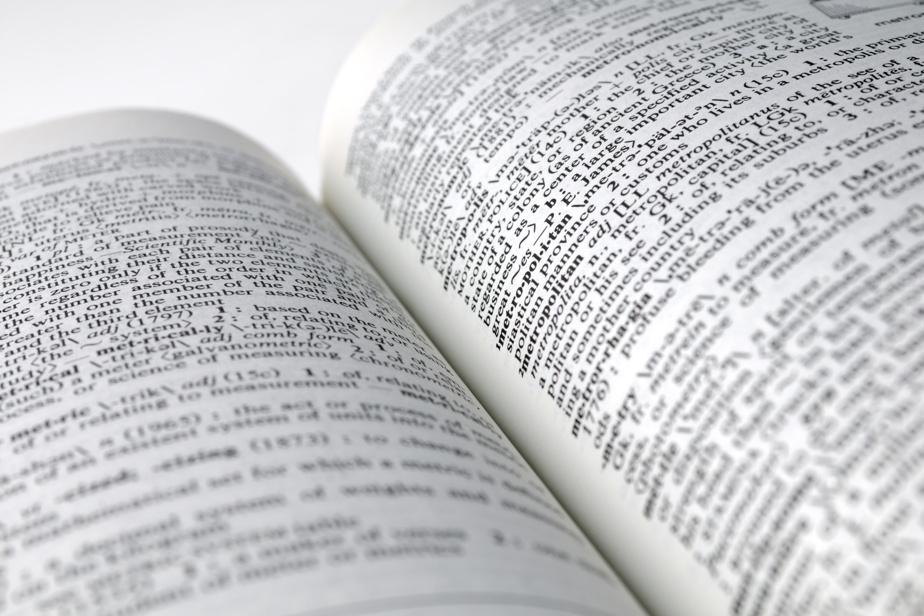The Robert The entry of the pronoun "iel" sows controversy<
The addition of the pronoun "iel" in the online version of the Le Robert dictionary has sparked a controversy in France that has echoed in Quebec. Explanations.
The controversy
“Iel, iels. Personal pronoun. Rare. Subject of the third person singular and plural, used to evoke a person whatever their gender”, can we read recently in the online dictionary – Le Robert. The entry into the dictionary of this pronoun formed from the contraction of the pronouns “he” and “she” provoked strong reactions in France and on social networks. "Inclusive writing is not the future of the French language", wrote on Twitter Tuesday the Minister of National Education, Youth and Sports, Jean-Michel Blanquer. The latter at the same time expressed his support for the deputy François Jolivet, who wrote to the French Academy to denounce the decision of the editions Le Robert. He made his letter public with a tweet in which he accuses the authors of the dictionary of being militants of "wokism".
The response
The heated debate on social networks prompted the general manager of Le Robert, Charles Bimbenet, to explain his team's decision to include the pronoun in its online dictionary. “While its use is still relatively low […], it has been growing strongly in recent months. Moreover, the meaning of the word “iel” cannot be understood by reading it alone […] and it seemed useful to us to specify its meaning for those who come across it, whether they wish to use it or on the contrary… reject it,” he wrote on the dictionary’s website. Charles Bimbenet, however, refrained from propagating any current of thought.
Measured light levels in a client’s lobby before a new art installation goes up on the walls. Have you measured you… https://t.co/JJNiCMSMMy
— Illumine Creative Solutions Sun Oct 27 01:48:32 +0000 2019
The reaction of lexicographers
Nadine Vincent, lexicographer and professor of communication at the University of Sherbrooke, thinks that the decision of Le Robert editions is premature. “A dictionary is in tow of usage. The word must be fairly frequent, fairly well distributed, therefore used in different fields, in different groups of society, and afterwards, it can enter the dictionary, "explains the one who is also a member of the editorial committee and the committee of governance of Usito, Quebec dictionary available online for free.

While the pronoun "iel" has been around for a long time, it hasn't gone into general use, she says. “There are many different proposals for the neutral pronoun,” adds Nadine Vincent, pointing out that activist groups do not agree on a single term to use. The lexicographer also regrets that in the definition of the pronoun, Le Robert does not specify how to use it. How should the associated adjectives be agreed? Le Robert gives no example.
You can't enter a word like that, not explain it, and let people make do with it. I consider that Le Robert is not doing his job.
Nadine Vincent, lexicographer
For its part, the Office québécois de la langue française indicated by email that it “does not recommend using the pronoun “iel””. Rather, it encourages the use of epicene writing. Bernard Cerquiglini, lexicographer at Larousse editions, believes that the decision of Le Robert editions “is part of a militant approach”. “We touch on a pronoun, on the language system. However, the pronouns have not changed since the fourth th century, “he argued in an interview with Le Figaro.
“There is still a long way to go”
The appearance of the pronoun “iel” in Le Robert is considered a step in the right direction by people from the trans and non-binary communities (whose members generally prefer the “non-binary” spelling) to whom La Presse spoke. “I find it interesting that some institutions end up recognizing non-binary people and their vocabulary. Of course, there is still a long way to go,” says Ash Paré.
"If we look at the definition of the word 'iel', it's a bit strange," notes Séré Gabriel Beauchesne Lévesque, of the TransEstrie organization.
It doesn't refer to non-binary people using it. It is not a pronoun that was invented to be used in the plural to refer to men and women.
Séré Gabriel Beauchesne Lévesque
"It's really a pronoun that was invented and first used by non-binary people who say, 'I'm not a man. I am not a woman. I want there to be a way to refer to me.” »
Ash Paré, who gives conferences on inclusive French, adds to the importance of the neutral and inclusive pronoun for members of his community. “This pronoun is a tool that allows you to respect the dignity of a person. “We still have no recognition of a non-binary identity from a legal point of view,” recalls Séré Gabriel Beauchesne Lévesque, who is concerned about the impact of Bill 2 recently tabled by the Coalition avenir Québec.


 Tags:
Tags: Prev
Prev







